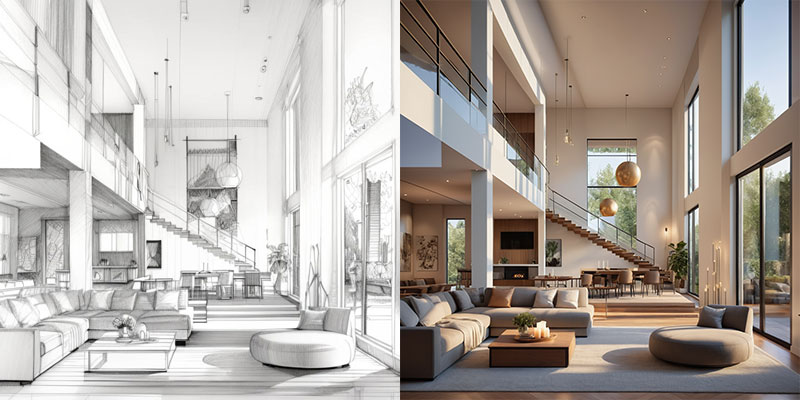친구를 초대하고 둘 다 무료 코인을 받으세요

2149
Malak Ghoneim
스케치 렌더링
v2
Create a series of architectural elevation renderings from this zonning plan for a sushi restaurant located on the tip of Strand am Flughafensee in Berlin, Germany. The restaurant should have a contemporary design with a timber structure and curtain glass walls that provide panoramic views of the lake and surrounding landscape. The restaurant should also feature a spacious deck with an infinity pool that blends seamlessly with the water of the lake.
The elevations should showcase the restaurant's harmonious integration with the natural setting, highlighting the use of natural materials and the interplay of light and shadow throughout the day and into the evening hours. Depict the restaurant at sunset, when the sky is awash in warm hues, and utilize artificial lighting to create a serene and inviting atmosphere.
The elevations should demonstrate thoughtful consideration of the site's unique topography and orientation, as well as the functional requirements of a sushi restaurant, such as the placement of the main entrance, kitchen, and dining areas. Emphasize the overall aesthetic cohesion of the design, with a focus on creating a seamless transition between the indoor and outdoor spaces.
Provide multiple elevation views, including the primary façade, side elevations, and any other relevant perspectives that best showcase the architectural design and its integration with the surrounding environment.
스타일:
사진술-현실적인
장면:
공공 건물,건물,날,날,레스토랑
모드:
정밀 개념
시점:
새의 눈으로 본 전경
조명:
반투명
0
리믹스
2
좋아요아직 댓글이 없습니다
더 비슷한 내용
2149
Malak Ghoneim
스케치 렌더링
v2
Create a series of architectural elevation renderings from this zonning plan for a sushi restaurant located on the tip of Strand am Flughafensee in Berlin, Germany. The restaurant should have a contemporary design with a timber structure and curtain glass walls that provide panoramic views of the lake and surrounding landscape. The restaurant should also feature a spacious deck with an infinity pool that blends seamlessly with the water of the lake.
The elevations should showcase the restaurant's harmonious integration with the natural setting, highlighting the use of natural materials and the interplay of light and shadow throughout the day and into the evening hours. Depict the restaurant at sunset, when the sky is awash in warm hues, and utilize artificial lighting to create a serene and inviting atmosphere.
The elevations should demonstrate thoughtful consideration of the site's unique topography and orientation, as well as the functional requirements of a sushi restaurant, such as the placement of the main entrance, kitchen, and dining areas. Emphasize the overall aesthetic cohesion of the design, with a focus on creating a seamless transition between the indoor and outdoor spaces.
Provide multiple elevation views, including the primary façade, side elevations, and any other relevant perspectives that best showcase the architectural design and its integration with the surrounding environment.
스타일:
사진술-현실적인
장면:
공공 건물,건물,날,날,레스토랑
모드:
정밀 개념
시점:
새의 눈으로 본 전경
조명:
반투명
0
리믹스
2
좋아요아직 댓글이 없습니다



























